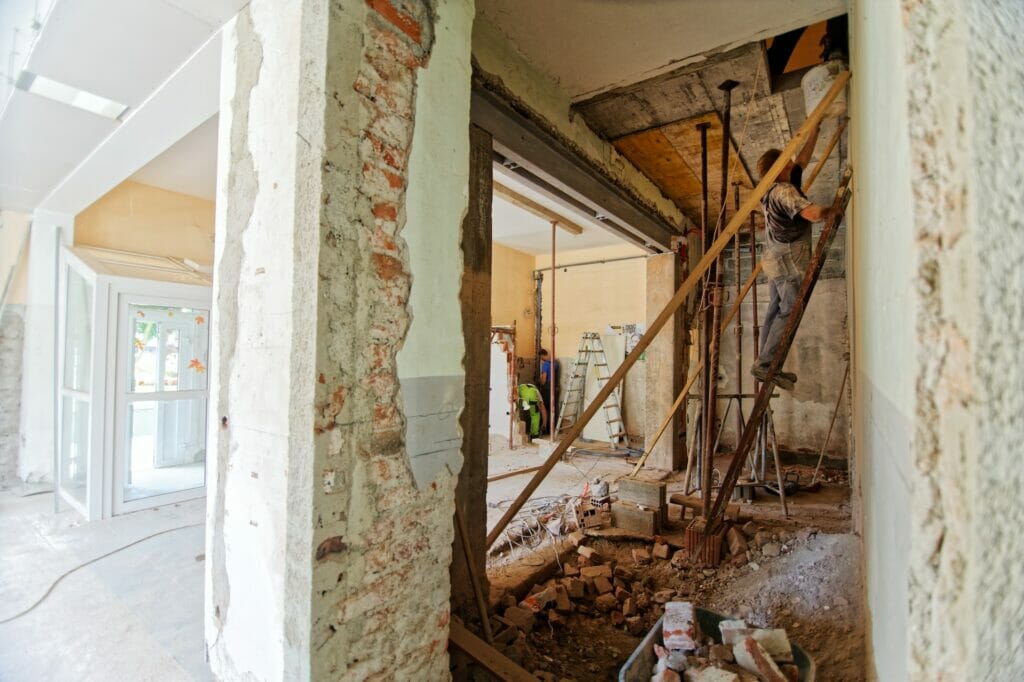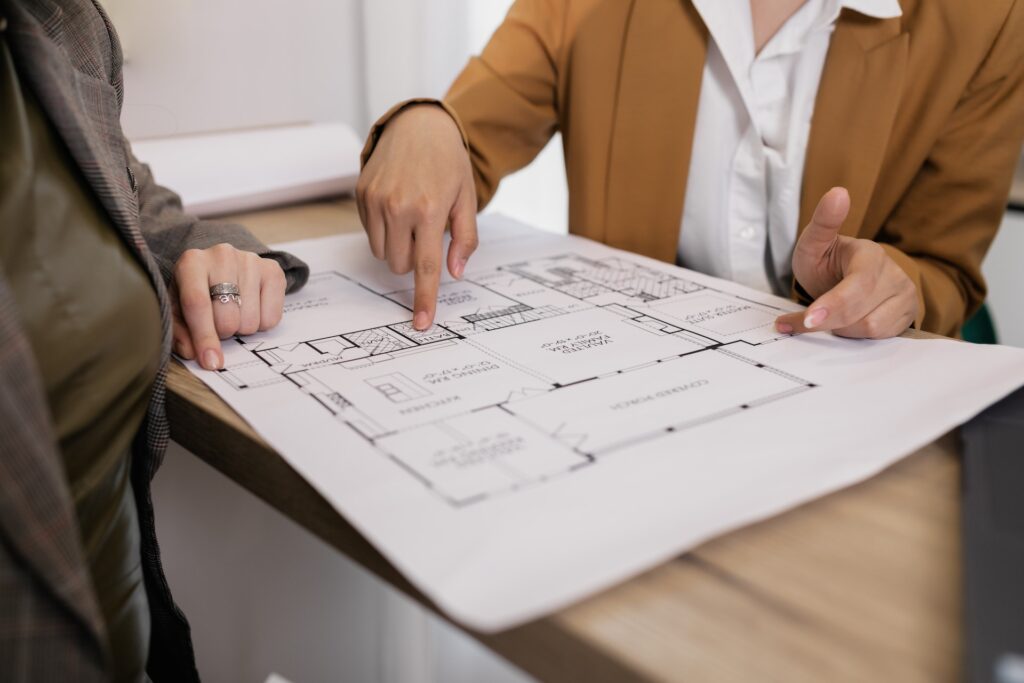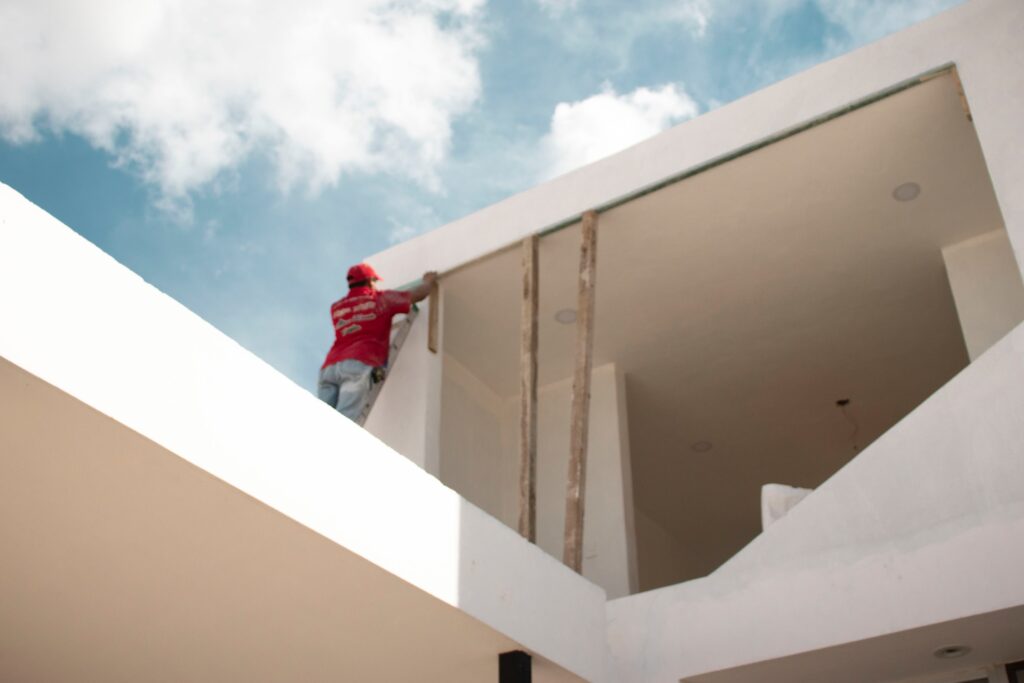The idea of buying and renovating a house in Portugal is a captivating prospect for many foreigners. However, venturing into the world of Portuguese real estate and embarking on a renovation journey requires careful planning and consideration.
Here, we offer essential tips to guide you through the process and help you transform a property into your dream Portuguese home.
Renovating a House in Portugal: Tips
1. Permit Process
Before you dive into the exciting world of renovation, it’s crucial to understand the legal requirements and permit process in Portugal. Regulations may differ from your home country, so take the time to familiarize yourself with local laws. Obtain the necessary permits to ensure a smooth renovation journey that’s compliant with Portuguese regulations.
2. Solving Structural Flaws in the Building
Properties with structural issues can hold hidden potential, but addressing these flaws is essential. Engage professionals to thoroughly inspect the property, identify structural challenges, and create a comprehensive plan for repairs. Ensuring a strong foundation paves the way for a successful renovation that stands the test of time.
3. Choose Quality Materials
When it comes to renovating a house, the choice of materials matters greatly. Portugal offers a rich selection of traditional and modern materials that not only enhance aesthetics but also ensure durability. Select high-quality materials that align with your vision, maintaining the property’s authenticity while incorporating your personal style.
4. Tackling Damp Challenges
Portugal’s climate can bring challenges like dampness, especially in older properties. Incorporate effective damp-proofing strategies during the renovation to create a healthy living environment. Proper insulation, ventilation, and moisture control measures are essential for both structural integrity and your well-being.
5. Enhancing Internal Layouts
A well-designed internal layout can significantly enhance the functionality and flow of your home. Consider how you’ll use each space and work with professionals to optimize layouts according to your lifestyle. Thoughtful planning ensures that your renovated space suits your needs and preferences.
6. Window Replacement
Upgrading windows is more than a cosmetic change; it’s an investment in energy efficiency, comfort, and aesthetics. Modern windows offer improved insulation and noise reduction, enhancing your living experience. Choose window designs that align with the property’s architecture while embracing modern technology.
7. Revitalizing Bathrooms and Kitchens
Bathrooms and kitchens are focal points of any home. Renovating these spaces can breathe new life into the property. Opt for functional layouts, quality fixtures, and stylish designs that enhance both utility and visual appeal.
8. Renewing Flooring
Flooring is the foundation of your interior design. Choose materials that suit the property’s character while reflecting your style preferences. Durable and visually appealing flooring options can transform the ambiance of each room.

How much it cost to renovate a house in Portugal?
The cost of renovating a house in Portugal can vary significantly depending on various factors such as the location of the property, the extent of the renovation, the size of the property, the quality of materials use, and the complexity of the work involved. Additionally, labor costs, permit fees, and unexpected expenses can also impact the overall cost.
Minor Renovation: A minor renovation that involves cosmetic changes, such as painting, small repairs, and updating fixtures, might cost around €500 to €1,000 per square meter.
Standard Renovation: A more extensive renovation that includes structural changes, kitchen and bathroom upgrades, electrical and plumbing work, and new flooring, could range from €1,000 to €1,500 per square meter.
Full Renovation: If you’re considering a complete overhaul that involves major structural changes, high-end finishes, and advance technologies, the cost could exceed €1,500 per square meter.
Hiring an architect in Portugal
Hiring an architect is a strategic decision that can greatly enhance the success, efficiency, and overall quality of your house renovation project. Whether you’re renovating a house in Portugal or anywhere else, working with an architect offers numerous benefits that can significantly impact the outcome of your project.
Here’s why hiring an architect is a smart choice:
Expertise and Creativity: Architects are highly trained professionals with a deep understanding of design principles, construction techniques, and spatial relationships. Their creative vision can transform your ideas into well-conceive, innovative designs that maximize the potential of your space.
Tailored Solutions: Every renovation project is unique. An architect can tailor their design solutions to meet your specific needs, preferences, and lifestyle. They take into account your functional requirements, aesthetic preferences, and any challenges posed by the existing structure.
Efficient Planning: Architects are skill in creating detail plans and drawings that act as a roadmap for your project. These plans not only guide the construction process but also streamline decision-making, reducing the likelihood of costly changes during construction.
Regulatory Compliance: Navigating local building codes, permits, and regulations can daunting. Architects are well-verse in these requirements and can ensure that your renovation project meets all legal standards, avoiding potential delays or legal issues.
Collaboration with Contractors: Architects act as a bridge between you and the contractors. They can communicate your vision clearly to the construction team, resolve any design-relate queries, and oversee the construction process to ensure it aligns with the design intent.
Problem Solving: Renovation projects often encounter unexpect challenges. Architects are skill problem-solvers who can adapt to unforeseen issues and propose effective solutions without compromising the design quality.

When should I pay for a house renovation?
When it comes to paying for a house renovation, the timing of payments can vary based on the specific agreements you have with contractors, architects, and other professionals involved in the project. Here are some common payment scenarios to consider:
Contractor Agreements: If you’ve hired a general contractor for your renovation project, payment terms are often outlined in the contract. Typically, you might see one of the following payment structures:
- Milestone Payments: Payments are made at specific milestones or stages of the project. For example, you might pay a certain percentage upfront, another percentage after the completion of framing, and so on.
- Progress Payments: Payments are made based on the percentage of work completed. As the project progresses, you pay according to the percentage of the job that’s finished.
- Final Payment: The final payment is made upon project completion and successful inspection. This payment is often withheld until you’re satisfied with the work and any minor touch-ups are addressed.
Architect and Design Fees: If you’ve hired an architect or a design professional, their fees might be structured differently. Some architects charge hourly rates, while others may charge a fixed fee for the entire project. Payments are usually spread out based on project phases, such as concept design, detailed planning, and construction oversight.
Materials and Suppliers: If you’re purchasing materials directly or through your contractor, you might need to make payments upfront or at specific stages of material delivery. Some suppliers might require a deposit before placing an order.
Permit Fees: Depending on the scope of your renovation and local regulations, there might be permit fees to pay. These fees are typically due before the permits are granted.

How long it take a renovation project?
The duration of a renovation project is a multifaceted question that lacks a definitive answer due to its dependency on various variables. Factors such as the intricacy of the scope of work, the dimensions of the property, the complexity of the renovations, and even unforeseen challenges all contribute to the timeline.
Renovation projects can range from a few weeks or months for minor updates to well over a year for comprehensive transformations, such as full-scale renovations. It’s important to recognize that each project is unique, and timelines should be tailored to the specifics of the endeavor to ensure accuracy and successful planning.
Some factors that can affect the timeline include:
- Weather: Outdoor work might be delayed by adverse weather conditions.
- Permitting: Obtaining necessary permits can sometimes cause delays.
- Customization: If you’re ordering custom materials or fixtures, they might take longer to arrive.
- Contractor Availability: The availability of contractors and skilled professionals can impact the project’s timeline.
- Unforeseen Issues: Discovering unexpected issues during demolition or renovation can lead to delays as solutions are devised.
Buying a house in Portugal as a foreigner
Foreigners are allowed to buy property in Portugal, and the process is relatively straightforward. However, there are some regulations and requirements that you should be aware of before you begin the process.
Here are some key points to keep in mind when buying a property in Portugal as a foreigner:
Tax Number (NIF) in Portugal
As a foreigner, you’ll need to obtain a Portuguese tax identification number (NIF) in order to buy a property in Portugal. This can be obtained from the Portuguese tax office (Finanças).
Portuguese Bank account
You’ll need to have a Portuguese bank account in order to purchase a property in Portugal. This is where you’ll transfer the funds for the purchase, pay the taxes and fees, and receive any rental income.
Legal Representation
It’s highly recommended to work with a Portuguese lawyer who is experienced in real estate transactions. They can help you navigate the legal aspects of the purchase and ensure that everything is in order.
Home Insurance
Known as property insurance, its mandatory in Portugal and provides coverage for damage to your property and personal belongings, as well as liability coverage if someone is injured on your property.
It can also provide coverage for natural disasters such as earthquakes or floods, which can be common in Portugal.

Why invest with Portugal Residency Advisors
Local Expertise
We know Portugal. Due to our extensive local knowledge, we believe that concentrating our services in a single country destination is the best way to give you the most thorough and useful information.
Holistic Approach
One single channel of communication for the entire process. We provide you with a comprehensive service that covers all aspects of your move, from identifying the ideal residency visa to finding your new home or helping you to settle.
Transparent Service
We recommend what’s best for you based on an extensive process experience that saves time and money to clients. Our pricing is clear and competitive, and we don’t sell services that make us more money.
Simple Process
Technology plays a very important role in our company. We minimize our clients’ involvement in paperwork. We are customers ourselves and we know how to serve you.
Frequently Asked Questions About Renovating a House in Portugal
Do I need permits for house renovations in Portugal?
Yes, depending on the nature of the renovation, you may need permits from local authorities. Regulations vary, and it’s essential to check with your local municipality to determine the specific permits required for your project.
How do I find a reliable contractor in Portugal?
Research local contractors, read reviews, ask for referrals from friends or neighbors, and consider consulting with architects or real estate professionals for recommendations. Always ask for references and review their previous work before making a decision.
Can I renovate an old property while preserving its historical features?
Yes, Portugal has a rich architectural heritage, and many renovation projects focus on preserving historical features while adding modern amenities. Architects experienced in historic preservation can guide you through this process.
What is the VAT rate for renovation work in Portugal?
The VAT (Value Added Tax) for construction and renovation work in Portugal is 23%.
What is the best time of year to start a renovation project in Portugal?
Spring and fall are often considered ideal for renovation projects due to milder weather conditions. However, this can vary based on the specific region and project requirements.
What steps can I take to ensure my renovation project stays on schedule?
Clear communication with your contractor, regular progress checks, and proactive problem-solving can help maintain the project’s timeline. It’s also wise to build some flexibility into your schedule to account for unexpected delays.
How long does a renovation project typically take in Portugal?
The duration of a renovation project in Portugal can vary greatly depending on factors such as the scope of work, property size, complexity of renovations, and unforeseen challenges. Minor projects might take a few weeks to a couple of months, while major renovations or full-scale transformations could extend beyond a year.




